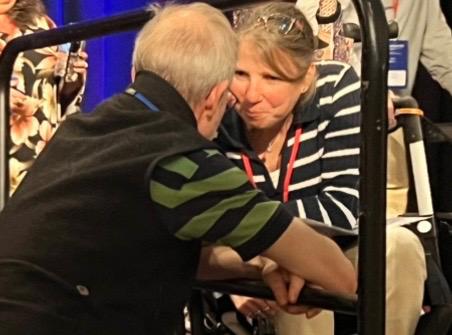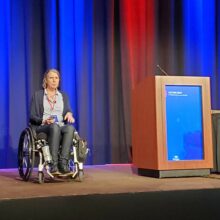By Ingrid de Groot, LCSW
I was grateful to attend the 2024 Global Conference on Myositis (GCOM) in Pittsburgh in March. While this was technically a conference for medical and research professionals, patients had a voice in the proceedings thanks to patient advocacy organizations (PAO’s) from ten countries who worked together to bring our concerns to the scientific community.
As a group, PAOs ran our own hybrid sessions in parallel to the scientific sessions. Approximately 40 individuals from around the world were present for these sessions. We also presented on stage during the main program, bringing patient concerns into the work of the scientific proceedings.
By comparison, during my first GCOM (Berlin 2019), I and a handful of other patients met together in a room far away from the conference venue. This year in Pittsburgh, I am filled with pride and gratitude to see how far we’ve come in our efforts to raise awareness of the needs and interests of the patient in the work of the professionals.
We as patients are now increasingly collaborating with other PAO’s across borders. We are increasingly and actively engaged in myositis research. We have a real impact on research, representing the face and voice of all those people directly and indirectly affected by myositis.
I am grateful for the opportunities I’ve had to be part of this process as awareness of patient impact on research has evolved. Years ago, not everyone in the scientific community was ready for or aware of our capabilities as people with a lived experience of myositis. There was little recognition for the value we could add to research. Luckily there have always been physicians, healthcare professionals, and researchers who did see value in patient input and have encouraged and supported us from the beginning.
I was invited to present on the PAO perspective during the opening session. We called this presentation “Nice to get acquainted,” and together our group of patient advocates decided to highlight several key aspects of what we as PAOs are capable of. This is, of course, our core business: educating, supporting, and advocating for people affected by myositis and their loved ones. I then shed some light on how we as patients and PAOs are increasingly and actively involved in research and some of the ways we do so. My final words were an invitation to come and meet with us during the conference. And luckily many attendees did!
The atmosphere of the conference was tingling with ambition, curiosity, and hope. It was so good to see and hear such drive in so many young healthcare professionals and researchers now focusing on myositis, their eagerness to learn more and learn from the more experienced colleagues, and to push boundaries in research.
One of the highlights was the “meet the patient expert” session, where six patients (one of them virtually) presented their myositis journey. Each one of us paid attention to different and very personal aspects of dealing with myositis in daily life. Some of these ideas included lack of multidisciplinary care and collaboration, consequences for professional careers and relationships, or features of the disease that are not always what they seem. (Shortness of breath could be interstitial lung disease, for example, but do not forget to check for diaphragm weakness!) After the session many attendees came up to us, bringing sometimes emotional and often insightful and very engaging discussions. I think this is a session to keep in mind for GCOMs to come!
The emotional feedback I personally got from a rheumatologist who told me that my story reminded him that this is why he became a doctor! He also told me that this was actually the first session during a medical conference that brought tears to his eyes. That says it all!

Some of my biggest take aways from the conference include:
- Research is increasingly being initiated or sponsored by patient organizations. It is striking and no coincidence that many of these studies focus on quality of life or the impact myositis has on someone’s life (including psychological impact) and how relatively little research money flows towards exactly those topics! I think we have to look into this more, especially when realizing that there still is no cure or even remotely helpful interventions for some types of myositis.
- Many patients long for interventions that offer some sort of control over their life with myositis. Diet, supplements, exercise, and holistic approaches are some prime examples of this. Research efforts also seem to be lacking in these areas. Again, it is our job to try and change this.
- Like many patients—and professionals!—I was excited to hear more about CAR T-cell therapy a new technology for reengineering immune cells that could revolutionize treatment of autoimmune diseases.
Looking back, I can only say that we, as PAOs, did a good job during this GCOM! We started new and strengthened existing relationships, started collaborations with other groups, and were excited to witness India starting their first official PAO. In this way we are giving voice and face to the people living with myositis.
Ingrid de Groot serves as a patient advocacy representative on TMA’s Medical Advisory Board. She is also a leader in the Dutch Myositis Working Group. She is grateful for the support of both of these groups that enabled her to attend GCOM 2024.


Fantastic summary – and thank you for being a changemaker on behalf of patients!
Thank you, Jane. I am lucky in many ways, one of these was how when I started my patient journey I met the right people who inspired and empowered me. The least I can do is pay this forward to all people living with myositis and their loved ones, regardless of where they are!
Thank you for sharing this very inspiring information and for being an advocate and voice for Myositis patients.
Thank you, Wanda! I am grateful for the opportunity TMA and the Dutch Myositis Grroup offered me to do all this: to offer me training and opportunities to attend medical conferences, where it is my ambition to make sure the face of patients is seen and their voice is heard and akcnowledged! Thank you for your support!
Hi. You mention diet as an approach so I want to tell you my experience. I was diagnosed with DM 3 years ago (PMScl75 positive) and ANA up to 1 in 1280 at worst. I have been following a gluten free whole food plant based diet for 2 years. I am in remission – PMScl75 now negative ANA <160. No medications now – I stopped methotrexate 2 months after starting this diet .
Dr Brook Goldner has had success with many autoimmune diseases using her smoothies solution . it was her success that led to me trying this diet.
It made a big difference to me feeling I could do something just by changing my diet.